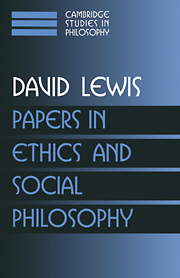Book contents
- Frontmatter
- Contents
- Introduction
- 1 Semantic analyses for dyadic deontic logic
- 2 A problem about permission
- 3 Reply to McMichael
- 4 Why ain'cha rich?
- 5 Desire as belief
- 6 Desire as belief II
- 7 Dispositional theories of value
- 8 The trap's dilemma
- 9 Evil for freedom's sake?
- 10 Do we believe in penal substitution?
- 11 Convention: Reply to Jamieson
- 12 Meaning without use: Reply to Hawthorne
- 13 Illusory innocence?
- 14 Mill and Milquetoast
- 15 Academic appointments: Why ignore the advantage of being right?
- 16 Devil's bargains and the real world
- 17 Buy like a MADman, use like a NUT
- 18 The punishment that leaves something to chance
- 19 Scriven on human unpredictability (with Jane S. Richardson)
- Index
19 - Scriven on human unpredictability (with Jane S. Richardson)
Published online by Cambridge University Press: 24 December 2009
- Frontmatter
- Contents
- Introduction
- 1 Semantic analyses for dyadic deontic logic
- 2 A problem about permission
- 3 Reply to McMichael
- 4 Why ain'cha rich?
- 5 Desire as belief
- 6 Desire as belief II
- 7 Dispositional theories of value
- 8 The trap's dilemma
- 9 Evil for freedom's sake?
- 10 Do we believe in penal substitution?
- 11 Convention: Reply to Jamieson
- 12 Meaning without use: Reply to Hawthorne
- 13 Illusory innocence?
- 14 Mill and Milquetoast
- 15 Academic appointments: Why ignore the advantage of being right?
- 16 Devil's bargains and the real world
- 17 Buy like a MADman, use like a NUT
- 18 The punishment that leaves something to chance
- 19 Scriven on human unpredictability (with Jane S. Richardson)
- Index
Summary
In his paper “An Essential Unpredictability in Human Behavior,” Michael Scriven offers an argument intended to show that it is impossible in principle to predict what a person (or indeed a suitable robot) will do in a certain possible kind of situation. Moreover, this unpredictability is independent of any indeterminism in physics, of any limitations on the predictor's knowledge of data and laws, and of any limitations on the reliability or amount of calculation the predictor can do. Scriven's argument is a purported proof that if a person in the designated situation is predicted, even by a predictor who does as well as is in principle possible, the prediction will turn out false.
We shall show that Scriven's argument depends on a hidden premise which we have no reason to accept. Without the hidden premise, Scriven cannot demonstrate any failure of prediction which we cannot explain away as due to limitations, in principle remediable, on the amount of calculation available to a given predictor. We conclude that Scriven's argument does not establish an essential unpredictability in human behavior in any interesting sense. Rather it is a reductio establishing the falsehood of Scriven's hidden premise.
SCRIVEN'S ARGUMENT
Let us imagine somebody who is trying to predict the outcome of a free choice by somebody else who is dominantly motivated to avoid being validly predicted. (The dramatis personae are called, respectively, the predictor and the avoider.) Perhaps the avoider has been put in a position where he stands to lose if the predictor knows in advance what he will choose; or perhaps he is just averse to being predicted.
- Type
- Chapter
- Information
- Papers in Ethics and Social Philosophy , pp. 244 - 250Publisher: Cambridge University PressPrint publication year: 1999



